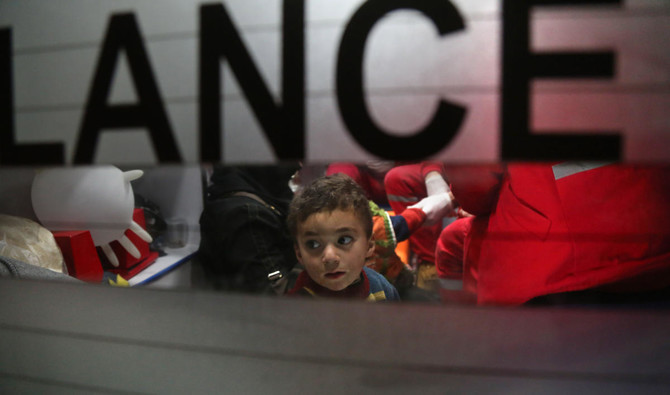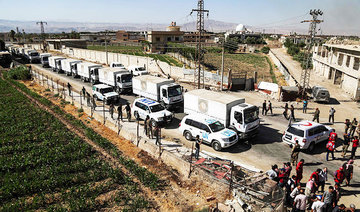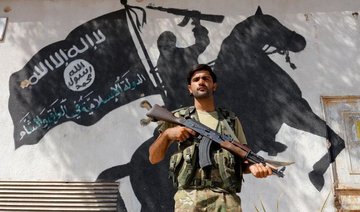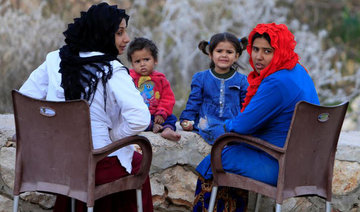DOUMA, Syria: Aid workers have begun evacuating emergency medical cases from Syria’s besieged rebel bastion of Eastern Ghouta, the Red Cross said on Wednesday, after months of waiting during which the United Nations said at least 16 people died.
Families waited in the darkness in the rebel-held town of Douma for their loved ones to board ambulances bound for hospitals in the capital Damascus.
Under a deal with the government, five workmen detained by the rebels during fierce clashes with the army in March were released in exchange.
Three children were among the first four patients to leave, Red Crescent official Ahmed Al-Saour told AFP.
He said in total 29 seriously ill people were due to be evacuated.
The first four were a girl with haemophilia, a baby with the autoimmune disorder Guillain-Barre, a child with leukaemia, and a man in need of a kidney transplant, he said.
Eight-year-old Ingy, the girl with haemophilia, gave a broad smile as she boarded an ambulance, wearing a woolly hat and gloves against the cold.
In another ambulance, one-year-old Mohammed lay in the lap of a Red Crescent worker, his mother sitting beside them in a long black cloak and a veil showing only her eyes.
“Tonight the @SYRedCrescent with @ICRC team started the evacuation of critical medical cases from #EasternGhouta to #Damascus,” the International Committee of the Red Cross said on its Twitter account.
The Syrian American Medical Society, another medical relief organization, said the evacuations covered “29 critical cases, approved for medical evacuation to Damascus. Four patients were evacuated today.”
It said the remainder would be evacuated in the coming days.
The dominant rebel faction in Eastern Ghouta, Jaish Al-Islam (Army of Islam), said the rebels had agreed to free some of their prisoners in return for the evacuations.
“We have agreed to the release of a number of prisoners... in exchange for the evacuation of the most urgent humanitarian cases,” the group said a statement.
Eastern Ghouta is one of the last remaining rebel strongholds in Syria and has been under a tight government siege since 2013, causing severe food and medical shortages for its nearly 400,000 residents.
While some food is still grown locally, or smuggled in, humanitarian access to the region has been limited despite regular appeals from aid agencies.
Last week, Jan Egeland, the head of the UN’s humanitarian taskforce for Syria, warned that at least 16 people had died while waiting for evacuation from Eastern Ghouta.
He said a list put together several months ago of nearly 500 civilians in desperate need of evacuation was rapidly shrinking.
“That number is going down, not because we are evacuating people, but because they are dying,” he told reporters in Geneva.
“We have confirmation of 16 having died on these lists since they were resubmitted in November, and it is probably higher,” he said, highlighting the case of a baby who died on December 14, as the latest round of Syria peace talks in Geneva ended in failure.
Egeland said evacuations and efforts to bring aid into the region had been blocked by a lack of authorizations from the Syrian authorities.
The Eastern Ghouta region, near the capital Damascus, is one of the last strongholds of rebels fighting the forces of President Bashar Assad.
It is one of four “de-escalation” zones agreed in May in a deal brokered by government backers Russian and Iran and rebel supporter Turkey.
The agreement led to some reduction in fighting but the government kept up its blockade and renewed its bombardment of the enclave in mid-November.
The government stands accused by its critics of using sieges of civilians as a weapon in its war against the rebels.
Rebel fighters pulled out of second city Aleppo and third city Homs, as well as districts of Damascus, only after prolonged blockades caused serious hardship to their families and other civilians.
More than 340,000 people have been killed and millions have been driven from their homes since Syria’s conflict erupted with anti-government protests in 2011.


























